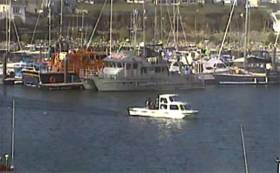Displaying items by tag: Jillian
#MCIB - The lack of a handheld VHF radio or float-free EPIRB potentially delayed the rescue of passengers from a capsized vessel off the Saltee Islands last August.
One man died by drowning but nine others were rescued after a five-hour ordeal at sea when their leisure craft was swamped in the channel between the islands, as previously reported on Afloat.ie.
According to the official report on the incident by the Marine Casualty Investigation Board (MCIB), the 21ft Dory named 'Jillian' was already low in the water when it set out from Kilmore Quay in Co Wexford on the afternoon of Saturday 29 August 2015 with its owner-skipper and nine passengers on board.
Shortly before 7pm, as the boat passed through the channel in what are commonly choppy waters towards fishing grounds south of Great Saltee, witness reports said that a wall of water came over the bow, forcing through the acrylic glass windows of the wheelhouse and flooding the cabin.
Before efforts could be made to bail out the boat or use the fixed VHF radio in the wheelhouse, the engine stopped and more water flooded in, causing the vessel to capsize quickly.
One passenger was trapped under the hull but was rescued moments later by one of the others, and all but one managed to climb onto the upturned hull.
With no handheld radio or EPIRB on the boat, the skipper and his passengers were unable to call for help. A flare found by one of the survivors was discarded as none knew how to operate it and feared injury in doing so.
Many hours later at midnight, as the group were having difficulty staying on the upturned hull, they attracted the attention of the Saltee Islands ferry which had joined the search party with the Kilmore Quay and Fethard RNLI and the Irish Coast Guard minutes before.
Within 20 minutes all 10 casualties had been taken aboard the ferry, but one was quickly transferred to the Kilmore Quay lifeboat when his health appeared to be failing.
Despite the swift actions of the lifeboat crew and the personnel of coastguard helicopter Rescue 117 who continued CPR, the man was pronounced dead on arrival at Wexford General Hospital.
The investigation later determined that the skipper did not know the maximum load capacity of his vessel, though it was built before such information was made mandatory for the maker's name plate.
It was therefore judged likely that the additional passenger weight caused the boat to sit low in the water, making it vulnerable to breaking waves in the rougher waters between the Saltees.
In addition, if the boat had carried a handheld radio or EPIRB, or had anyone on board knowledge of how to use a flare, it's likely that the party could have been rescued earlier, the report concluded.
The complete MCIB report into the 'Jillian' incident is available to read or download HERE.





























































